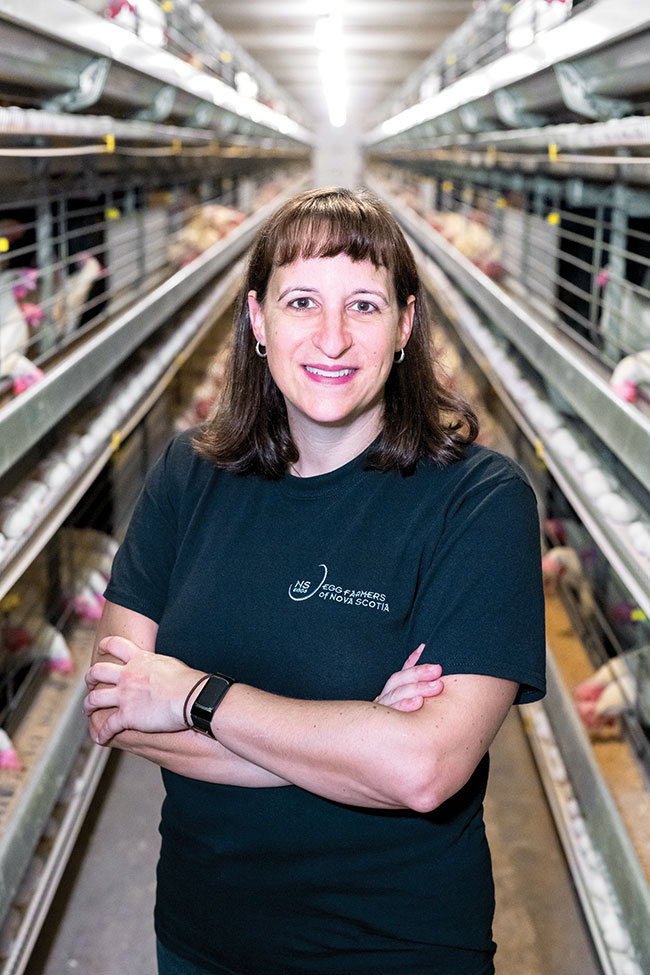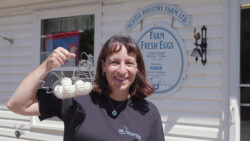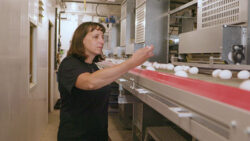
Who’s Who – Nova Scotia – Jill Thomas
By Treena Hein
Features ProducersJill Thomas operates the family farm, Scotia Poultry Farm in Cole Harbour, N.S., and also acts as a dedicated egg ambassador.
 Jill Thomas operates the family farm, Scotia Poultry Farm in Cole Harbour, N.S., with her mother Sharon and brother Ian.
PHOTO CREDIT: Egg Farmers of Canada
Jill Thomas operates the family farm, Scotia Poultry Farm in Cole Harbour, N.S., with her mother Sharon and brother Ian.
PHOTO CREDIT: Egg Farmers of Canada Like many egg farmers in Canada, Jill Thomas started helping on the farm at a young age, is actively involved in serving her industry at the board level and always assists the industry when called upon. However, few egg farmers in Canada serve the public directly the way Thomas and her family do, selling tens of thousands of eggs every month at the farm gate to ensure the community always has a fresh and economical protein source.
Thomas operates the family farm, Scotia Poultry Farm in Cole Harbour, N.S., with her mother Sharon and brother Ian. “My parents Sharon and Laurie bought the farm in 1973,” she says. “I started working in the barns when I was 14. I attended Nova Scotia Agricultural College in Truro (now part of Dalhousie University) for an agricultural business diploma, and this year, I’ve been full time for 27 years. Unfortunately, my dad passed away in 2001, but my mom still comes to work every day. My cousin Andrew Cook works with us and also Ian’s two sons, Connor and Owen.”
The Thomas farm has just over 36,000 hens and supplies Atlantic Poultry under the Nova Eggs brand.
The farm has two connected barns, and both were upgraded in 2015 and 2020 for higher energy efficiency, with changes to insulation, ventilation and barn environment controls. They also installed LED lights and high-efficiency fans.
In 2020, one of the barns was converted to Valli enriched housing. “We just placed our fourth flock in the enriched barn, and it’s been a learning curve but overall, it’s an easy system to work with, and the hens are healthier and happier,” Thomas says.
“We’ve had reduced mortality, feather pecking and increased egg production. We’re a bit unusual in our location in that we’re isolated from other poultry farms, yet we are minutes to the main shopping in Cole Harbour and can be in downtown Halifax in 25 mins or less. Since avian influenza (AI) arrived again last year, we’ve added to our biosecurity in bringing back foot baths for our outdoor shoes and we also added foot baths for our barn boots as well.”
Feed cost has increased over the last two years in Nova Scotia, which Thomas says is quite a concern. “It’s been so volatile due to a lot of reasons out of our control, so we pay close attention,” she explains. “We installed feed tank scales to better monitor feed consumption and eliminate waste by making sure there’s no spillage. Recently, we’ve upped our protein a little and consumption has dipped a little. We also put a bigger feed tank in to supply one barn, so we’ve cut delivery from twice a week to once a week.”
Selling to the public
The most outstanding feature of her operation is the on-farm store (but since the pandemic and last year’s AI outbreaks, only curbside pickup).

Thomas sells thousands of eggs each month through her on-farm store.
PHOTO CREDIT: Egg Farmers of Canada
Every weekday afternoon from 1:00 to 4:30 a.m., Thomas (if she’s not away) meets those in cars pulling up in the driveway, gets their order and brings it out. “We’re quite a bit cheaper than the regular grocery stores here,” she says. “We want to make sure eggs are as affordable as possible, and we want to support those people who want locally produced food. We didn’t have major increases in our prices during the past two years, like the grocery stores did. We sell dozens, 18 packs and flats. In total, we sell about 1,800 dozen a week on farm.”
The Thomas’s have met so many people in their community this way, and indeed, some of their customers have been coming to buy eggs for 30 years. “And many times, they have questions,” Thomas says. “The most common is the difference between white and brown eggs. We used to produce white and brown, but now we get brown eggs delivered here when our eggs are picked up, because some customers prefer them. We sell them for about 15 cents more a dozen and as everyone in the industry knows, they do stay fresher longer due to being less porous.”
The egg sales are also a way to keep in touch with the community on social media. Customers want to know holiday availability but are also keen to know when there are double yolkers for sale. “They are really, really popular,” Thomas says.
“Mom checks them by hand. We could get two to five flats a day when the hens are just starting to come into lay, but of course, some hens lay them their whole lives. It’s a great fit, as these eggs can’t be sold as commercial table eggs as they’re too large and more breakable. We charge 60 cents more a dozen over our jumbo price and jumbos are our biggest seller. Customers can get our jumbos for less than large in the grocery stores.”
Promoting eggs
Thomas calls herself an egg ambassador, and is doing more every year to promote eggs at a broad range of public events. These include at the rink (Thomas is a former competitive curler who has competed at the Scotties Tournament of Hearts twice), ‘Meet the Farmer’ events and cooking competitions.

In 2020, Thomas converted one of her barns to Valli enriched housing.
“There have been a lot of events over the last year or so,” she says. “At the finish line of Maritime Race Week, I gave out hard-boiled eggs and promotional materials. My family and I have also worked with Egg Farmers of Nova Scotia and Egg Farmers of Canada to provide eggs for the breakfast program at one school so far this year, and to sponsor our Nova Scotia Wheelchair curling team at Nationals. We also took part as a family in the 50th anniversary of EFNS TV spot and I did a TV commercial for Fields to Forks. I’ve really pushed myself outside of my comfort zone.”
Part of the confidence to do this has come from participating in the ‘Women in the Egg Industry’ Program. Each woman egg farmer is matched with another somewhere across the country to chat about similarities and differences between farm operations, but also how to deal with the same day-to-day issues and pressures. It’s a one-year program that Thomas engaged in two years ago with an egg farmer in Manitoba named Sandra.
“I really enjoyed it and I’d like to do it again,” she says. “It’s a great opportunity to make friendships with fabulous women across the country with the same lifestyle. It starts in Ottawa with an event for the incoming and outgoing participants and you have events throughout the year online on different topics.
“There was one session about life-work balance that was really good. The farm for me is like a baby and it comes first, and it can be hard for me to get that balance sometimes, to delegate. There were also great sessions on time management through out your day, how to handle different pressures, and how to use social media.”
Thomas adds, “you get to encourage and cheer for each other. I was able to cheer on Sandra as she took the step to run for her provincial board and she was successful with being voted on! When I decided to agree to be nominated this year (thanks to a push from a past participant), it gave me confidence to see how great Sandra was doing and know I could reach out if I needed some encouragement. I just started on the board here in March, so I’m the newbie, but it’s great to see that our board has a lot of women now.”
Looking forward
Conversion of the other barn to enriched will likely involve about 18 months of planning. “The last renovation of this barn was a huge project,” Thomas says. “We had to rebuild the barns from foundation up with all new lumber, insulation, Trusscore walls, ventilation and barn controls, so this one won’t be as much work with just the housing, but there’s still a lot involved. We’d also like to install some solar panels in the near future.”
And perhaps a third ‘Farm of the Year Award’ (from Egg farmers of NS) is the cards. The Thomas’s won in 2014 and again in 2022.
“It’s a huge honour for us to win twice,” says Thomas. “It really makes us proud of how hard we all have worked. I find farming very satisfying every day. It’s really rewarding to produce such a nutritious wholesome product that everyone can eat and everyone seems to love. I also get to see my mom and other family every day. I’ve really treasured that time and I’ll continue to treasure it.”
Print this page